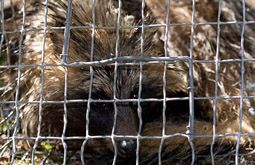Raccoon dogs on farms
On fur farms, raccoon dogs are held in standard cages between 0.6 and 1 m² in size and heights of 60 to 75 cm. Usually, these farms will also keep foxes. The cages have mesh wire floors and are completely unstructured. The mesh wire floors cause injuries and deformations of the paws. Extensive tracking and hunting, an elementary behavior of raccoon dogs, is impossible in such cages. Furthermore, on such farms, raccoon dogs are rarely provided access to water to swim and dive in which is a natural requirement. Consequently, they live monotonous lives, unable to behave naturally and thus often walk back and forth endlessly in their cages or chew on the cage bars.
The young are separated from their mothers at 6 to 8 weeks of age. This does not comply with the natural behavior or biology of the raccoon dog. The raccoon dogs are then kept either individually or in couples (male and female). A nesting box is made available only to give birth to their young, otherwise the animals have no possibility to withdraw and hide. The constant proximity to other raccoon dogs leads to permanent stress. Unable to determine distances themselves and with no possibility to withdraw, raccoon dogs adopt behavioral disturbances. Some chew their own fur. The smell of the other animals and the excrements below the cages are further stress factors. For animals with such a pronounced sense of smell, this is torture.
The raccoon dogs are regularly taken out of their cages (with pliers) for breeding, for their fur to be measured, for medicating and for cages to be switched. The animals react to all of this with anxiety and fear.
Permanent stress

A raccoon dog fur farm in China
Additional information
-
The «Humane Society of the United States» and its Fur free campaign
The Canadian environmental protection organization «Global Action Network» and its extensive anti-fur campaign.
